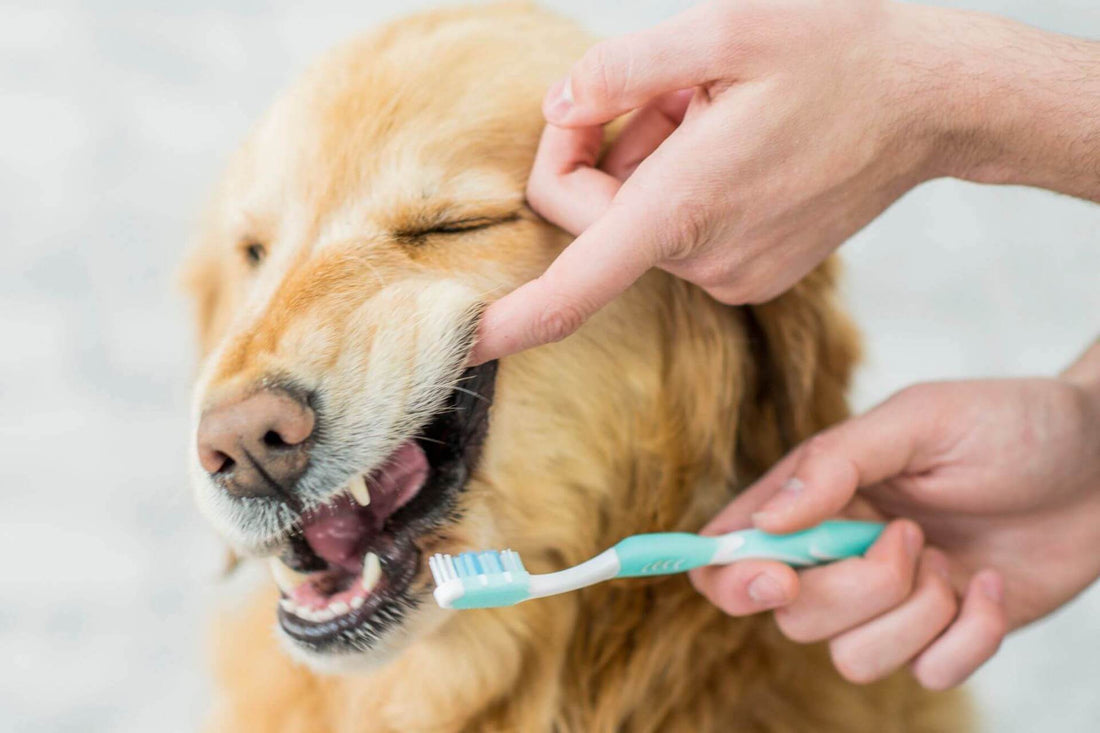As a dog owner, you're probably already aware of the importance of providing your furry friend with proper care to ensure their overall health and well being. However, one aspect of pet care that is often overlooked is their dental hygiene. Just like humans, dogs need regular dental care to maintain good oral health and prevent dental problems such as gum disease, tooth decay, bad breath, and in severe cases, teeth loss.
Here are some tips on how to keep your dog's dental care routine and hygiene in check.
#1: Brush their teeth regularly
One of the best ways to keep your dog healthy and happy is to brush its teeth. Brushing helps prevent dental disease and the health problems that can come from it.
Dogs are naturally very clean animals, but they can still develop dental issues. Use a toothbrush and a dog-specific pet toothpaste (not human toothpaste) to ensure that your dog receives proper oral health benefits. Toothpaste for humans is not recommended, as it could be harmful. You can also use chew toys to help to clean their teeth while they're playing with them.

#2: Provide them with chew toys and dental treats
Dental treats are designed to clean your dog's teeth and gums by scraping away plaque and tartar buildup. They're great for use on a daily basis—just make sure you only give them one at a time!
Chew toys come in many different shapes and sizes, but they all have one thing in common: they're designed to be chewed on! Chew toys can help keep your dog's teeth clean while also providing them with hours of entertainment.

#3: Feed Your Dog with a Balanced and Nutrition Diet
You can help maintain your dog’s diet with proper dry and wet food. Feed them with well-balanced and quality food and avoid table scraps.
Feeding your dog a balanced and nutritious diet is important for their overall health and well-being. The key to their healthy diet is to provide them with various food types that are rich in protein, vitamins, minerals and other nutrients.
Feeding them twice a day with high-quality dry food should be the main source of nutrition, but an occasional treat or small meal of canned food can be given as well.
#4: Take your dog for regular, professional dental cleaning.
Take them for regular check-ups and vet visits! Regular cleanings will reward you with preventive measures that prevent tartar buildup, plaque accumulation, dental plaque, and periodontal disease.
Dental disease is a real problem in dogs, and it can have serious consequences. The earlier you get your dog's teeth cleaned, the more likely they are to avoid serious problems later on down the line. If you're worried about how much it will cost to have your dog's teeth cleaned regularly, don't be. Professional dental cleanings are actually quite affordable.

#5: Avoid giving your dog sugary treats or human food.
You might be tempted to give your dog a treat that's sweet, salty, or crunchy. But those aren't the best treats for dogs. Sugary treats can cause dental problems for your pooch and too much salt can lead to hypertension. Human foods like chocolate and grapes are toxic to dogs because they contain caffeine and/or phenylalanine, which can be poisonous when ingested in large amounts over time.

Causes of Dental Diseases in Dogs
There are several reasons why a dog may suffer from dental disease.
- Lack of proper dental care, such as regular brushing and dental cleanings.
- Poor diet with minimal chewing or crunchy foods that help scrape plaque from the teeth.
- Genetics, some dog breeds are predisposed to dental issues.
- Illnesses or conditions that affect the mouth and teeth.
- Aging, as dogs get older, their teeth and gums can become weak and susceptible to disease.
Symptoms of Bad Dental Health in Dogs
Bad breath is one of the most common symptoms of dental problems in dogs. It's important to remember that bad breath can be caused by other factors, like gum disease or even a respiratory infection. If your dog's breath smells particularly foul and is getting worse over time, though, it could be a sign that something is wrong with his dental health.
Importance of Oral Hygiene for Pet Dogs
Dental hygiene is crucial to your dog's overall health, and neglecting it can lead to severe issues. Here are some reasons why maintaining good dental hygiene for dogs is vital:
-
Prevents gum disease: Gum disease is a common oral health issue in dogs and can cause inflammation and bleeding of the gums, leading to pain, discomfort, and even tooth loss.
-
Protects against Tooth Decay: Just like humans, dogs can also develop cavities and tooth decay if they consume a lot of sugary foods and drinks.
-
Improves Overall Health: Poor dental hygiene can lead to the spread of harmful bacteria and toxins throughout the body, causing various health issues such as heart disease and kidney disease.
-
Freshens Breath: Bad breath is a common issue in dogs and can be caused by plaque and tartar buildup.
- Increases Lifespan: Maintaining good dental hygiene can help extend your dog's lifespan by preventing oral health issues that can lead to periodontal health problems.
As pet owners, having your pet's teeth clean and shiny can save them from periodontal disease later down the road. By following a regular dental routine, professional cleaning, and seeking veterinary care when necessary, you can ensure your furry friends can have healthy teeth. Our care for dogs can go a long way!


